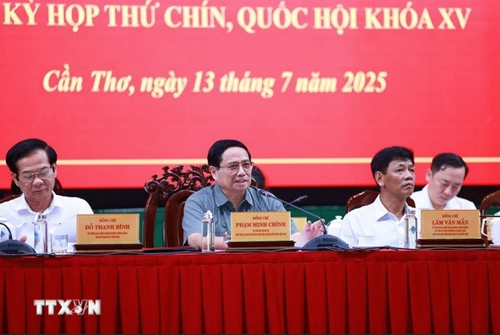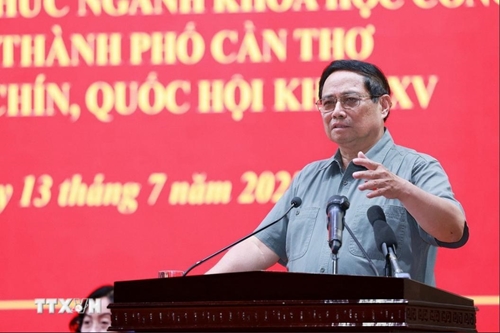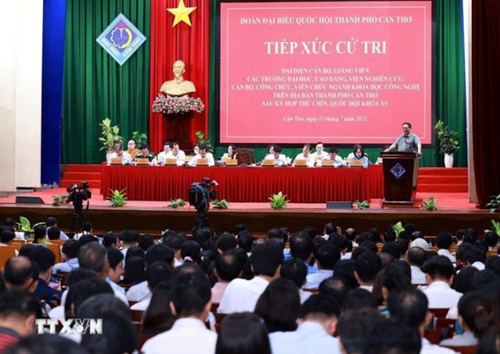This marked the third voter meeting of the city’s delegation of N.A. deputies following the 9th session of the 15th N.A., and notably, the first thematic session focusing on science and technology.
    |
 |
|
It is the PM's first voter engagement in Can Tho since the administrative merger of former Can Tho city with Hau Giang and Soc Trang provinces. |
It was also the PM's first voter engagement in Can Tho since the administrative merger of former Can Tho city with Hau Giang and Soc Trang provinces.
The meeting drew over 1,000 participants, including academics, postgraduate students, civil servants, and technology professionals. Delegates briefed constituents on the outcomes of the 9th N.A. session, which concluded after 35 days of rigorous discussion. The session saw the adoption of 34 laws, 14 legal resolutions and reviews of six draft bills. Significantly, the legislature passed a resolution amending several articles of the 2013 Constitution.
The N.A. also approved shortening the current legislative term and local council tenures (2021–2026) and confirmed that the general election for the next term will take place on Sunday, March 15, 2026.
Currently, the Can Tho N.A. deputy delegation has 21 members, including PM Pham Minh Chinh and N.A. Chairman Tran Thanh Man.
The delegation reported on local implementation of national policies related to science, technology, innovation, and digital transformation, particularly the rollout of Resolution No.57-NQ/TW of the Politburo dated December 22, 2024.
    |
 |
|
Prime Minister Pham Minh Chinh speaks at the meeting. |
At the meeting, voters raised various concerns, including issues related to scientific funding, commercialization of research, digital skills development, and the need to retain talent within the national science and technology ecosystem. The PM and senior officials responded to these concerns, outlining measures to remove financial bottlenecks, reform research grant mechanisms, and boost private and social sector participation in innovation.
PM Pham Minh Chinh underscored the importance of increasing science and technology spending, from 3% of the state budget this year to 5% next year, along with tax incentives, preferential credit, visa facilitation, and housing policies for overseas Vietnamese experts.
He noted that priority will be given to developing high-quality human resources for emerging sectors such as semiconductors and AI, protecting intellectual property, and creating favorable conditions for collaboration between the "four pillars" of scientific research - government, academia, business, and the public.
The PM highlighted recent national achievements, including sustained political stability, social security, and economic growth. Vietnam’s GDP is projected to top ASEAN and rank among the world’s fastest-growing economies.
The Government’s push to eliminate substandard housing, particularly for policy-beneficiary households, is also expected to reach its targets ahead of schedule.
He also pointed to the smooth operations of the new two-tier local government model.
    |
 |
|
An overview of the meeting |
Praising Can Tho’s growing contributions to national development, the Government leader called for the city to lead in all key areas, particularly in science, technology, innovation, and digital transformation.
He urged the city to revive the stalled Can Tho Oncology Hospital project, accelerate the 1-million-hectare high-quality, low-emission rice program for the Mekong Delta, and support digital education initiatives like “Digital Literacy for All.”
He encouraged Can Tho University to form digital transformation support teams to assist local communities and take the lead in human capital development for the semiconductor industry and the digital economy.
Source: VNA